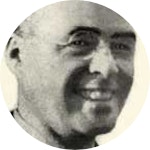Introductory Note:
In his classic book, A Testament of Devotion, Thomas Kelly quotes Meister Eckhart: “There are plenty to follow our Lord half-way, but not the other half.” Kelly goes on to investigate how we move from half-hearted to whole-hearted obedience. He encourages the reader: “Begin where you are. Obey now. Use what little obedience you are capable of, even if it be like a grain of mustard seed.”
 Excerpt from A Testament of Devotion
Excerpt from A Testament of Devotion
Meister Eckhart wrote: “There are plenty to follow our Lord half-way, but not the other half. They will give up possessions, friends and honors, but it touches them too closely to disown themselves.” It is just this astonishing life which is willing to follow Him the other half, sincerely to disown itself, this life which intends complete obedience, without my reservations, that I would propose to you in all humility, in all boldness, in all seriousness. I mean this literally, utterly, completely, and I mean it for you and for me — commit your lives in unreserved obedience to Him.
If you don’t realize the revolutionary explosiveness of this proposal you don’t understand what I mean. Only now and then comes a man or a woman who, like John Woolman or Francis of Assisi, is willing to be utterly obedient, to go the other half, to follow God’s faintest whisper.
…Our interest just now is in the life of complete obedience to God, not in amazing revelations of His glory graciously granted only to some. Yet the amazing experiences of the mystics leave a permanent residue, a God-subdued, a God-possessed will. States of consciousness are fluctuating. The vision fades. But holy and listening and alert obedience remains, as the core and kernel of a God-intoxicated life, as the abiding pattern of sober, workaday living. And some are led into the state of complete obedience by this well-nigh passive route, wherein God alone seems to be the actor and we seem to be wholly acted upon. And our wills are melted and dissolved and made pliant, being firmly fixed in Him, and He wills in us.
But in contrast to this passive route to complete obedience most people must follow what Jean-Nicholas Grou calls the active way, wherein we must struggle and, like Jacob of old, wrestle with the angel until the morning dawns, the active way wherein the will must be subjected bit by bit, piecemeal and progressively, to the divine Will.
The first step to the obedience of the second half is the flaming vision of the wonder of such a life, a vision which comes occasionally to us all, through biographies of the saints, through the journals of Fox and early Friends, through a life lived before our eyes, through a haunting verse of the Psalms — “Whom have I in heaven but Thee? And there is none upon earth that I desire beside Thee” (Ps. 73:25) — through meditation upon the amazing life and death of Jesus, through a flash of illumination or, in Fox’s language, “a great opening.”
But whatever the earthly history of this moment of charm, this vision of an absolutely holy life is, I am convinced, the invading, urging, inviting, persuading work of the Eternal One. It is curious that modern psychology cannot account wholly for flashes of insight of any kind, sacred or secular. It is as if a fountain of creative Mind were welling up, bubbling to expression within prepared saints.
There is an infinite fountain of lifting power, pressing within us, luring us by dazzling visions, and we can only say, the creative God comes into our souls. An increment of infinity is about us. Holy is imagination, the gateway of reality into our hearts. The Hound of Heaven is on our track, the God of Love is wooing us to His Holy Life.
Once having the vision, the second step to holy obedience is this: Begin where you are. Obey now. Use what little obedience you are capable of, even if it be like a grain of mustard seed. Begin where you are. Live this present moment, this present hour as you now sit in your seats, in utter, utter submission and openness toward Him.
Listen outwardly to these words, but within, behind the scenes, in the deeper levels of your lives where you are all alone with God the Loving Eternal One, keep up a silent prayer, “Open Thou my life. Guide my thoughts where I dare not let them go. But Thou darest. Thy will be done.” Walk on the streets and chat with your friends. But every moment behind the scenes be in prayer, offering yourselves in continuous obedience.
I find this internal continuous prayer life absolutely essential. It can be carried on day and night, in the thick of business, in home and school. Such prayer of submission can be so simple. It is well to use a single sentence, repeated over and over and over again, such as this: “Be Thou my will. Be Thou my will,” or “I open all before Thee. I open all before Thee,” or “See earth through heaven. See earth through heaven.”
And the third step in holy obedience, or a counsel, is this: If you slip and stumble and forget God for an hour, and assert your old proud self, and rely upon your own clever wisdom, don’t spend too much time in anguished regrets and self-accusations but begin again, just where you are.
Yet a fourth consideration in holy obedience is this: Don’t grit your teeth and clench your fists and say, “I will! I will!” Relax. Take hands off. Submit yourself to God. Learn to live in the passive voice — a hard saying for Americans — and let life be willed through you. For “I will” spells out obedience.
The fruits of holy obedience are many. But two are so closely linked together that they can scarcely be treated separately. They are the passion for personal holiness and the sense of utter humility. God inflames the soul with a craving for absolute purity. But He, in His glorious otherness, empties us of ourselves in order that He may become All.
But there is something about deepest humility which makes men bold. For utter obedience is self-forgetful obedience. No longer do we hesitate and shuffle and apologize because, say we, we are weak, lowly creatures and the world is a pack of snarling wolves among whom we are sent as sheep by the Shepherd (Matt. 10:16). I must confess that, on human judgment, the world tasks we face are appalling — well-nigh hopeless. Only the inner vision of God, only the God-blindedness of unreservedly dedicated souls, only the utterly humble ones can bow and break the raging pride of a power-mad world.
Excerpted from Thomas Kelly’s A Testament of Devotion, pp.59 – 67; 124. HarperOne, 1994.
Photo by Maxime Amoudruz on Unsplash
Text First Published January 1941 · Last Featured on Renovare.org November 2021


